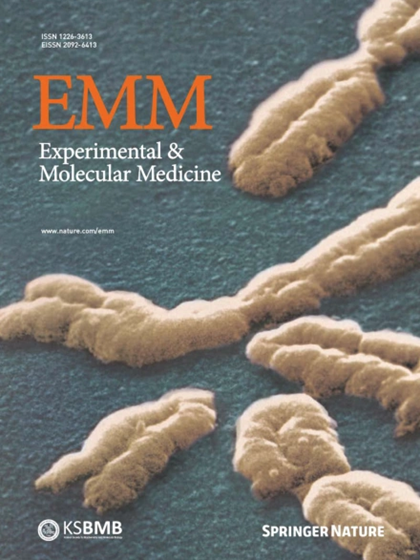通过Ephexin1-Axin1相互作用破坏β-连环蛋白破坏复合体可促进结直肠癌的增殖。
IF 9.5
2区 医学
Q1 BIOCHEMISTRY & MOLECULAR BIOLOGY
引用次数: 0
摘要
Wnt信号对于细胞生长和肿瘤形成至关重要,在结直肠癌(CRC)中异常激活,促进肿瘤进展;然而,其在肿瘤发展中的具体作用和调控机制尚不清楚。本研究表明,鸟嘌呤核苷酸交换因子Ephexin1在结直肠癌中显著过表达,并与Wnt/β-catenin通路活性增加相关。通过综合分析,包括TCGA的RNA测序数据和功能分析,我们发现Ephexin1通过激活Wnt/β-catenin通路促进肿瘤的增殖和迁移。这种作用是由Ephexin1与Axin1的相互作用介导的,Axin1是β-catenin破坏复合物的关键成分,它反过来增强了β-catenin在肿瘤发生关键信号通路中的稳定性和活性。重要的是,我们的研究结果还表明,靶向Ephexin1可能会增加Wnt/β-catenin途径抑制剂在CRC治疗中的疗效。这些发现强调了以Ephexin1为靶点开发有效的CRC治疗策略的潜力,提示了一种新的有前途的治疗方法,旨在抑制癌症进展。本文章由计算机程序翻译,如有差异,请以英文原文为准。

Disruption of the β-catenin destruction complex via Ephexin1-Axin1 interaction promotes colorectal cancer proliferation
Wnt signaling is essential for cell growth and tumor formation and is abnormally activated in colorectal cancer (CRC), contributing to tumor progression; however, the specific role and regulatory mechanisms involved in tumor development remain unclear. Here, we show that Ephexin1, a guanine nucleotide exchange factor, is significantly overexpressed in CRC and is correlated with increased Wnt/β-catenin pathway activity. Through comprehensive analysis, including RNA sequencing data from TCGA and functional assays, we observed that Ephexin1 promotes tumor proliferation and migration by activating the Wnt/β-catenin pathway. This effect was mediated by the interaction of Ephexin1 with Axin1, a critical component of the β-catenin destruction complex, which in turn enhanced the stability and activity of β-catenin in signaling pathways critical for tumor development. Importantly, our findings also suggest that targeting Ephexin1 may increase the efficacy of Wnt/β-catenin pathway inhibitors in CRC treatment. These findings highlight the potential of targeting Ephexin1 as a strategy for developing effective treatments for CRC, suggesting a novel and promising approach to therapy aimed at inhibiting cancer progression. Wnt signaling is crucial for cell growth and is often overactive in cancers like colorectal cancer (CRC). This study explores the role of a protein called Ephexin1 in CRC. Researchers found that Ephexin1 is overexpressed in CRC and promotes tumor growth by activating Wnt/β-catenin signaling. They used various cell lines and animal models to study this interaction. The study involved analyzing gene expression data from The Cancer Genome Atlas (TCGA) and conducting experiments to understand how Ephexin1 affects β-catenin stability, a key player in Wnt signaling. Results showed that reducing Ephexin1 levels made CRC cells more sensitive to Wnt inhibitors, suggesting that targeting Ephexin1 could enhance treatment efficacy. The researchers conclude that Ephexin1 is a potential therapeutic target for CRC, as it plays a significant role in Wnt signaling modulation. This summary was initially drafted using artificial intelligence, then revised and fact-checked by the author.
求助全文
通过发布文献求助,成功后即可免费获取论文全文。
去求助
来源期刊

Experimental and Molecular Medicine
医学-生化与分子生物学
CiteScore
19.50
自引率
0.80%
发文量
166
审稿时长
3 months
期刊介绍:
Experimental & Molecular Medicine (EMM) stands as Korea's pioneering biochemistry journal, established in 1964 and rejuvenated in 1996 as an Open Access, fully peer-reviewed international journal. Dedicated to advancing translational research and showcasing recent breakthroughs in the biomedical realm, EMM invites submissions encompassing genetic, molecular, and cellular studies of human physiology and diseases. Emphasizing the correlation between experimental and translational research and enhanced clinical benefits, the journal actively encourages contributions employing specific molecular tools. Welcoming studies that bridge basic discoveries with clinical relevance, alongside articles demonstrating clear in vivo significance and novelty, Experimental & Molecular Medicine proudly serves as an open-access, online-only repository of cutting-edge medical research.
 求助内容:
求助内容: 应助结果提醒方式:
应助结果提醒方式:


